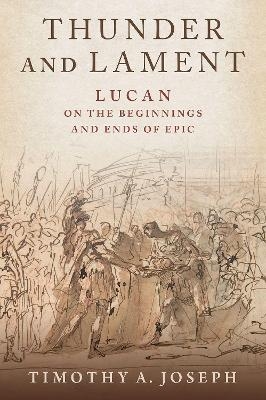
Thunder and Lament
Lucan on the Beginnings and Ends of Epic
Seiten
2022
Oxford University Press Inc (Verlag)
978-0-19-758214-5 (ISBN)
Oxford University Press Inc (Verlag)
978-0-19-758214-5 (ISBN)
Lucan's epic poem Pharsalia tells the story of the cataclysmic "end of Rome" through the victory of Julius Caesar and Caesarism in the civil wars of 49-48 BCE. In Thunder and Lament, Timothy Joseph examines how Lucan's poetic agenda moves in lockstep with his narrative arc, as the poet fashions the Pharsalia to mark the momentous end of the epic genre. To accomplish the closure of the genre, Lucan engages pervasively and polemically with the very first works of Greek and Roman epic - inverting, collapsing, undoing, and completing tropes and themes introduced in Homer's Iliad and Odyssey and in the foundational Latin epic poems by Livius Andronicus, Naevius, and most of all Ennius.
Thunder and Lament is the first book-length study of Lucan's engagement with the Homeric poems and the works of early Latin epic. By focusing on Lucan's effort to "surpass the poets of old" - a phrase the poet Statius would use of his achievement - this study deepens our appreciation of Lucan's poetic accomplishment and of the tensions between beginning and ending that lie at the heart of the epic genre. Statius also read Lucan as a poet who both "thunders" and "laments", and Joseph argues that Lucan closes off epic's beginnings through gestures of thundering poetic violence and also through a transformation and completion of the conventional epic mode of lament. Equipped with these two registers of closure, each engaging and taking aim at epic's primal texts, Lucan positions the Pharsalia as epic's final song.
Thunder and Lament is the first book-length study of Lucan's engagement with the Homeric poems and the works of early Latin epic. By focusing on Lucan's effort to "surpass the poets of old" - a phrase the poet Statius would use of his achievement - this study deepens our appreciation of Lucan's poetic accomplishment and of the tensions between beginning and ending that lie at the heart of the epic genre. Statius also read Lucan as a poet who both "thunders" and "laments", and Joseph argues that Lucan closes off epic's beginnings through gestures of thundering poetic violence and also through a transformation and completion of the conventional epic mode of lament. Equipped with these two registers of closure, each engaging and taking aim at epic's primal texts, Lucan positions the Pharsalia as epic's final song.
Timothy A. Joseph is Professor of Classics at the College of the Holy Cross and the author of Tacitus the Epic Successor.
Acknowledgements
Editions and abbreviations
Introduction - "You who will surpass the poets of old"
Chapter 1 - Lucan at and against epic's beginnings
Chapter 2 - Toppling topoi: epic's violence directed against itself
Chapter 3 - The Pharsalia and the end of the Ennian story
Chapter 4 - Lucan and the closing of the maritime moment
Chapter 5 - The Pharsalia and the loss of nostos
Chapter 6 - Epic's last lament
Conclusion - Lucan and the living dead
Bibliography
| Erscheinungsdatum | 16.03.2022 |
|---|---|
| Zusatzinfo | 1 |
| Verlagsort | New York |
| Sprache | englisch |
| Maße | 241 x 163 mm |
| Gewicht | 567 g |
| Themenwelt | Geisteswissenschaften ► Sprach- / Literaturwissenschaft ► Anglistik / Amerikanistik |
| Geisteswissenschaften ► Sprach- / Literaturwissenschaft ► Literaturwissenschaft | |
| ISBN-10 | 0-19-758214-1 / 0197582141 |
| ISBN-13 | 978-0-19-758214-5 / 9780197582145 |
| Zustand | Neuware |
| Informationen gemäß Produktsicherheitsverordnung (GPSR) | |
| Haben Sie eine Frage zum Produkt? |
Mehr entdecken
aus dem Bereich
aus dem Bereich
Poetik eines sozialen Urteils
Buch | Hardcover (2023)
De Gruyter (Verlag)
CHF 83,90
Buch | Softcover (2024)
belleville (Verlag)
CHF 27,95


